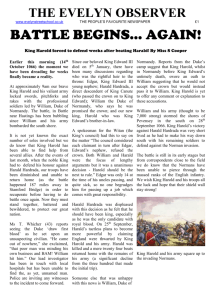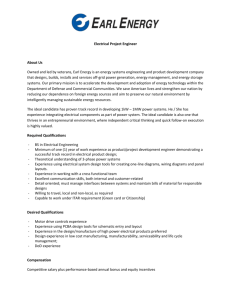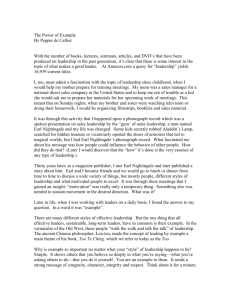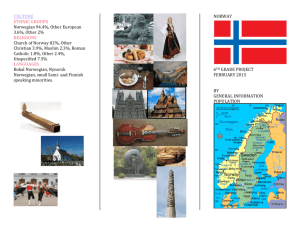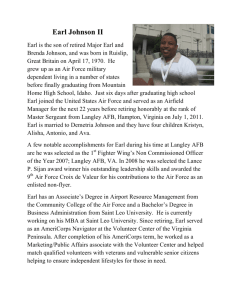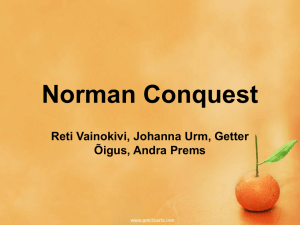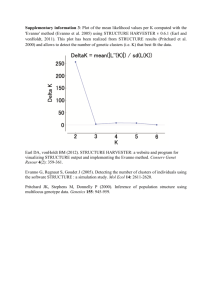Saga of Harald Hardrada by Snorri Sturluson
advertisement
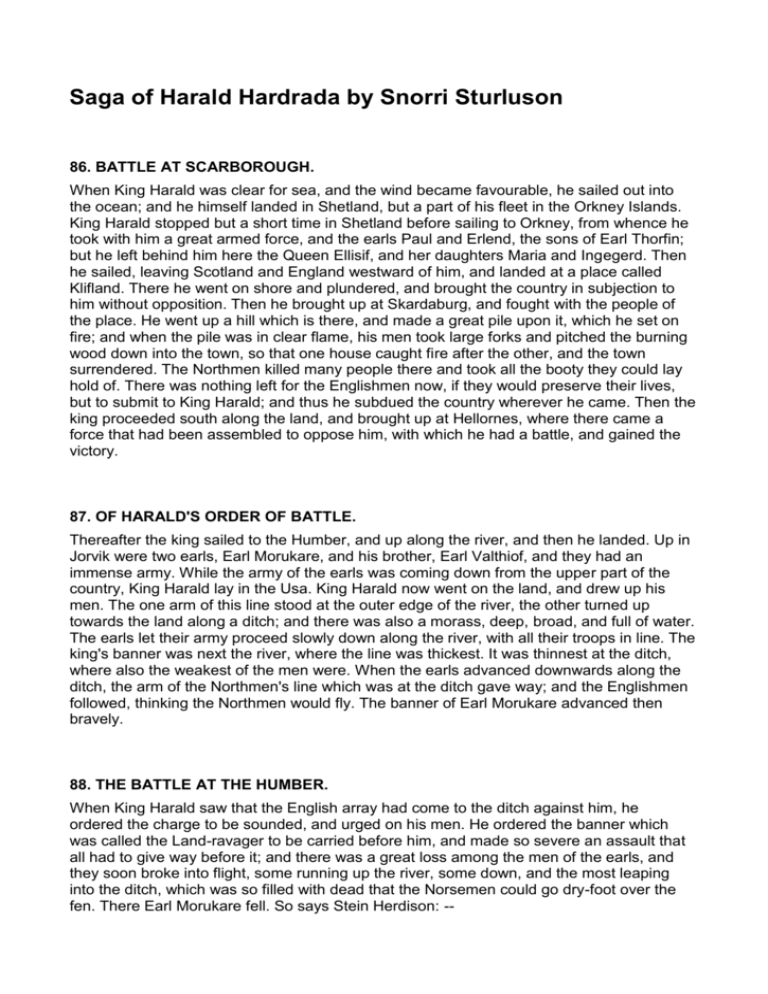
Saga of Harald Hardrada by Snorri Sturluson 86. BATTLE AT SCARBOROUGH. When King Harald was clear for sea, and the wind became favourable, he sailed out into the ocean; and he himself landed in Shetland, but a part of his fleet in the Orkney Islands. King Harald stopped but a short time in Shetland before sailing to Orkney, from whence he took with him a great armed force, and the earls Paul and Erlend, the sons of Earl Thorfin; but he left behind him here the Queen Ellisif, and her daughters Maria and Ingegerd. Then he sailed, leaving Scotland and England westward of him, and landed at a place called Klifland. There he went on shore and plundered, and brought the country in subjection to him without opposition. Then he brought up at Skardaburg, and fought with the people of the place. He went up a hill which is there, and made a great pile upon it, which he set on fire; and when the pile was in clear flame, his men took large forks and pitched the burning wood down into the town, so that one house caught fire after the other, and the town surrendered. The Northmen killed many people there and took all the booty they could lay hold of. There was nothing left for the Englishmen now, if they would preserve their lives, but to submit to King Harald; and thus he subdued the country wherever he came. Then the king proceeded south along the land, and brought up at Hellornes, where there came a force that had been assembled to oppose him, with which he had a battle, and gained the victory. 87. OF HARALD'S ORDER OF BATTLE. Thereafter the king sailed to the Humber, and up along the river, and then he landed. Up in Jorvik were two earls, Earl Morukare, and his brother, Earl Valthiof, and they had an immense army. While the army of the earls was coming down from the upper part of the country, King Harald lay in the Usa. King Harald now went on the land, and drew up his men. The one arm of this line stood at the outer edge of the river, the other turned up towards the land along a ditch; and there was also a morass, deep, broad, and full of water. The earls let their army proceed slowly down along the river, with all their troops in line. The king's banner was next the river, where the line was thickest. It was thinnest at the ditch, where also the weakest of the men were. When the earls advanced downwards along the ditch, the arm of the Northmen's line which was at the ditch gave way; and the Englishmen followed, thinking the Northmen would fly. The banner of Earl Morukare advanced then bravely. 88. THE BATTLE AT THE HUMBER. When King Harald saw that the English array had come to the ditch against him, he ordered the charge to be sounded, and urged on his men. He ordered the banner which was called the Land-ravager to be carried before him, and made so severe an assault that all had to give way before it; and there was a great loss among the men of the earls, and they soon broke into flight, some running up the river, some down, and the most leaping into the ditch, which was so filled with dead that the Norsemen could go dry-foot over the fen. There Earl Morukare fell. So says Stein Herdison: -- "The gallant Harald drove along, Flying but fighting, the whole throng. At last, confused, they could not fight, And the whole body took to flight. Up from the river's silent stream At once rose desperate splash and scream; But they who stood like men this fray Round Morukare's body lay." This song was composed by Stein Herdison about Olaf, son of King Harald; and he speaks of Olaf being in this battle with King Harald, his father. These things are also spoken of in the song called "Harald's Stave": -"Earl Valthiof's men Lay in the fen, By sword down hewed, So thickly strewed, That Norsemen say They paved a way Across the fen For the brave Norsemen." Earl Valthiof, and the people who escaped, fled up to the castle of York; and there the greatest loss of men had been. This battle took place upon the Wednesday next Mathias' day (A.D. 1066). 89. OF EARL TOSTE. Earl Toste had come from Flanders to King Harald as soon as he arrived in England, and the earl was present at all these battles. It happened, as he had foretold the king at their first meeting, that in England many people would flock to them, as being friends and relations of Earl Toste, and thus the king's forces were much strengthened. After the battle now told of, all people in the nearest districts submitted to Harald, but some fled. Then the king advanced to take the castle, and laid his army at Stanforda-bryggiur (Stamford Bridge); and as King Harald had gained so great a victory against so great chiefs and so great an army, the people were dismayed, and doubted if they could make any opposition. The men of the castle therefore determined, in a council, to send a message to King Harald, and deliver up the castle into his power. All this was soon settled; so that on Sunday the king proceeded with the whole army to the castle, and appointed a Thing of the people without the castle, at which the people of the castle were to be present. At this Thing all the people accepted the condition of submitting to Harald, and gave him, as hostages, the children of the most considerable persons; for Earl Toste was well acquainted with all the people of that town. In the evening the king returned down to his ships, after this victory achieved with his own force, and was very merry. A Thing was appointed within the castle early on Monday morning, and then King Harald was to name officers to rule over the town, to give out laws, and bestow fiefs. The same evening, after sunset, King Harald Godwinson came from the south to the castle with a numerous army, and rode into the city with the good-will and consent of the people of the castle. All the gates and walls were beset so that the Northmen could receive no intelligence, and the army remained all night in the town. 90. OF KING HARALD'S LANDING. On Monday, when King Harald Sigurdson had taken breakfast, he ordered the trumpets to sound for going on shore. The army accordingly got ready, and he divided the men into the parties who should go, and who should stay behind. In every division he allowed two men to land, and one to remain behind. Earl Toste and his retinue prepared to land with King Harald; and, for watching the ships, remained behind the king's son Olaf; the earls of Orkney, Paul and Erlend; and also Eystein Orre, a son of Thorberg Arnason, who was the most able and best beloved by the king of all the lendermen, and to whom the king had promised his daughter Maria. The weather was uncommonly fine, and it was hot sunshine. The men therefore laid aside their armour, and went on the land only with their shields, helmets and spears, and girt with swords; and many had also arrows and bows, and all were very merry. Now as they came near the castle a great army seemed coming against them, and they saw a cloud of dust as from horses' feet, and under it shining shields and bright armour. The king halted his people, and called to him Earl Toste, and asked him what army this could be. The earl replied that he thought it most likely to be a hostle army, but possibly it might be some of his relations who were seeking for mercy and friendship, in order to obtain certain peace and safety from the king. Then the king said, “We must all halt, to discover what kind of a force this is. ”They did so; and the nearer this force came the greater it appeared, and their shining arms were to the sight like glancing ice. 91. OF EARL TOSTE'S COUNSEL. Then said King Harald, “Let us now fall upon some good sensible counsel; for it is not to be concealed that this is an hostile army and the king himself without doubt is here." Then said the earl, “The first counsel is to turn about as fast as we can to our ships to get our men and our weapons, and then we will make a defence according to our ability; or otherwise let our ships defend us, for there these horsemen have no power over us." Then King Harald said, “I have another counsel. Put three of our best horses under three of our briskest lads and let them ride with all speed to tell our people to come quickly to our relief. The Englishmen shall have a hard fray of it before we give ourselves up for lost." The earl said the king must order in this, as in all things, as he thought best; adding, at the same time, it was by no means his wish to fly. Then King Harald ordered his banner Landravager to be set up; and Frirek was the name of him who bore the banner. 92. OF KING HARALD'S ARMY. Then King Harald arranged his army, and made the line of battle long, but not deep. He bent both wings of it back, so that they met together; and formed a wide ring equally thick all round, shield to shield, both in the front and rear ranks. The king himself and his retinue were within the circle; and there was the banner, and a body of chosen men. Earl Toste, with his retinue, was at another place, and had a different banner. The army was arranged in this way, because the king knew that horsemen were accustomed to ride forwards with great vigour, but to turn back immediately. Now the king ordered that his own and the earl's attendants should ride forwards where it was most required. "And our bowmen," said he, "shall be near to us; and they who stand in the first rank shall set the spear-shaft on the ground, and the spear-point against the horseman's breast, if he rides at them; and those who stand in the second rank shall set the spear-point against the horse's breast." 93. OF KING HARALD GODWINSON. King Harald Godwinson had come with an immense army, both of cavalry and infantry. Now King Harald Sigurdson rode around his array, to see how every part was drawn up. He was upon a black horse, and the horse stumbled under him, so that the king fell off. He got up in haste and said, "A fall is lucky for a traveller." The English king Harald said to the Northmen who were with him, “Do ye know the stout man who fell from his horse, with the blue kirtle and the beautiful helmet?" "That is the king himself." said they. The English king said, "A great man, and of stately appearance is he; but I think his luck has left him." 94. OF THE TROOP OF THE NOBILITY. Twenty horsemen rode forward from the Thing-men's troops against the Northmen's array; and all of them, and likewise their horses, were clothed in armour. One of the horsemen said, “Is Earl Toste in this army?" The earl answered, “It is not to be denied that ye will find him here." The horseman says, “Thy brother, King Harald, sends thee salutation, with the message that thou shalt have the whole of Northumberland; and rather than thou shouldst not submit to him, he will give thee the third part of his kingdom to rule over along with himself." The earl replies, “This is something different from the enmity and scorn he offered last winter; and if this had been offered then it would have saved many a man's life who now is dead, and it would have been better for the kingdom of England. But if I accept of this offer, what will he give King Harald Sigurdson for his trouble?" The horseman replied, “He has also spoken of this; and will give him seven feet of English ground, or as much more as he may be taller than other men." "Then," said the earl, “go now and tell King Harald to get ready for battle; for never shall the Northmen say with truth that Earl Toste left King Harald Sigurdson to join his enemy's troops, when he came to fight west here in England. We shall rather all take the resolution to die with honour, or to gain England by a victory." Then the horseman rode back. King Harald Sigurdson said to the earl, “Who was the man who spoke so well?" The earl replied, “That was King Harald Godwinson." Then, said King Harald Sigurdson, “That was by far too long concealed from me; for they had come so near to our army, that this Harald should never have carried back the tidings of our men's slaughter." Then said the earl, “It was certainly imprudent for such chiefs, and it may be as you say; but I saw he was going to offer me peace and a great dominion, and that, on the other hand, I would be his murderer if I betrayed him; and I would rather he should be my murderer than I his, if one of two be to die." King Harald Sigurdson observed to his men, “That was but a little man, yet he sat firmly in his stirrups." It is said that Harald made these verses at this time: -"Advance! advance! No helmets glance, But blue swords play In our array. Advance! advance! No mail-coats glance, But hearts are here That ne'er knew fear." His coat of mail was called Emma; and it was so long that it reached almost to the middle of his leg, and so strong that no weapon ever pierced it. Then said King Harald Sigurdson, “These verses are but ill composed; I must try to make better;" and he composed the following: -"In battle storm we seek no lee, With skulking head, and bending knee, Behind the hollow shield. With eye and hand we fend the head; Courage and skill stand in the stead Of panzer, helm, and shield, In hild's bloody field." Thereupon Thiodolf sang: -"And should our king in battle fall, -A fate that God may give to all, -His sons will vengeance take; And never shone the sun upon Two nobler eaglet; in his run, And them we'll never forsake." 95. OF THE BEGINNING OF THE BATTLE. Now the battle began. The Englishmen made a hot assault upon the Northmen, who sustained it bravely. It was no easy matter for the English to ride against the Northmen on account of their spears; therefore they rode in a circle around them. And the fight at first was but loose and light, as long as the Northmen kept their order of battle; for although the English rode hard against the Northmen, they gave way again immediately, as they could do nothing against them. Now when the Northmen thought they perceived that the enemy were making but weak assaults, they set after them, and would drive them into flight; but when they had broken their shield-rampart the Englishmen rode up from all sides, and threw arrows and spears on them. Now when King Harald Sigurdson saw this, he went into the fray where the greatest crash of weapons was, and there was a sharp conflict, in which many people fell on both sides. King Harald then was in a rage, and ran out in front of the array, and hewed down with both hands; so that neither helmet nor armour could withstand him, and all who were nearest gave way before him. It was then very near with the English that they had taken to flight. So says Arnor, the earls' skald: -"Where battle-storm was ringing, Where arrow-cloud was singing, Harald stood there, Of armour bare, His deadly sword still swinging. The foeman feel its bite; His Norsemen rush to fight, Danger to share, With Harald there, Where steel on steel was ringing." 96. FALL OF KING HARALD. King Harald Sigurdson was hit by an arrow in the windpipe, and that was his death-wound. He fell, and all who had advanced with him, except those who retired with the banner. There was afterwards the warmest conflict, and Earl Toste had taken charge of the king's banner. They began on both sides to form their array again, and for a long time there was a pause in fighting. Then Thiodolf sang these verses: -"The army stands in hushed dismay; Stilled is the clamour of the fray. Harald is dead, and with him goes The spirit to withstand our foes. A bloody scat the folk must pay For their king's folly on this day. He fell; and now, without disguise, We say this business was not wise." But before the battle began again Harald Godwinson offered his brother, Earl Toste, peace, and also quarter to the Northmen who were still alive; but the Northmen called out, all of them together, that they would rather fall, one across the other, than accept of quarter from the Englishmen. Then each side set up a war-shout, and the battle began again. So says Arnor, the earls' skald: -- "The king, whose name would ill-doers scare, The gold-tipped arrow would not spare. Unhelmed, unpanzered, without shield, He fell among us in the field. The gallant men who saw him fall Would take no quarter; one and all Resolved to die with their loved king, Around his corpse in a corpse-ring."
